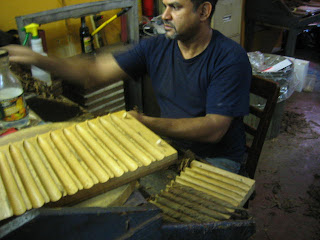La-Rosa Cigars
VANISHED (from Manhattan):
Last week Lost City brought the sad news that La-Rosa Cigars has left 6th Avenue and gone to the Bronx. We saw this coming in 2007 when the neighborhood of florists and wig shops was targeted for "revitalization." Now that the big glass towers have come, let's look back at what we've lost.
Originally posted October 2007:

Much is changing along 6th Avenue in the upper 20s and lower 30s, but there remains a fascinating assemblage of small businesses -- holdout flower shops, wig shops, and assorted wholesalers. Sadly, many of them are vanishing as luxury hotels, condos, and retail towers flatten the neighborhood.
On the second floor of 862 6th Avenue is a small cigar factory and shop that’s been in the area since 1958. La-Rosa Cubana Cigars was founded by A. Antonio Almanzar, a cigar maker from the Dominican Republic. It is now run by his son Frank.
When you step inside the shop, you are pleasantly overcome by the deliciously strong, organic fragrance of tobacco leaves. It feels like another place, another time. Bales of tobacco just shipped from the Caribbean wait by the door. Three master rollers make cigars in stages. Their work area is littered with brown leaves and brings to mind images from Lewis Hine’s Lower East Side, though La Rosa’s shop is more cheerful -- and those old Lower East Siders didn’t have posters of pin-up girls on their walls to keep them company.

La-Rosa has a packed humidor and 70-year-old wooden molds that belonged to Frank's father. Once inside the molds, the cigars are pressed for about an hour then wrapped in a sheet of Connecticut light, a soft leaf that feels like silk from being aged for five years. “Tobacco is like wine,” Frank told me, “When you age it, it gets a vintage taste.”
Frank knows cigars. He began working in his father’s shop when he was 9 years old. His job was to vein-strip the leaves until he learned to roll, beginning with mini-torpedoes. He still enjoys rolling these mild little cigars and generously gave me a handful. We lit up in the shop and it was a treat to smoke indoors. Since Bloomberg’s smoking ban went into effect, Frank has had to cut his production — and his workers. He used to have 7 rollers, now it’s just the 3.

Frank holding mini-torpedoes before a photo of his father
The view outside his window is changing, too. Where once there stood a mixed assemblage of low-rise buildings, there soon will rise a glass tower, with yet another giant coming one block north and several more just to the south. Like many of New York's remaining small businesses and longtime residents, La-Rosa is rapidly being surrounded by "revitalization." But what could be more vital to our city than shops like Frank Almanzar's?
Last week Lost City brought the sad news that La-Rosa Cigars has left 6th Avenue and gone to the Bronx. We saw this coming in 2007 when the neighborhood of florists and wig shops was targeted for "revitalization." Now that the big glass towers have come, let's look back at what we've lost.
Originally posted October 2007:

Much is changing along 6th Avenue in the upper 20s and lower 30s, but there remains a fascinating assemblage of small businesses -- holdout flower shops, wig shops, and assorted wholesalers. Sadly, many of them are vanishing as luxury hotels, condos, and retail towers flatten the neighborhood.
On the second floor of 862 6th Avenue is a small cigar factory and shop that’s been in the area since 1958. La-Rosa Cubana Cigars was founded by A. Antonio Almanzar, a cigar maker from the Dominican Republic. It is now run by his son Frank.
When you step inside the shop, you are pleasantly overcome by the deliciously strong, organic fragrance of tobacco leaves. It feels like another place, another time. Bales of tobacco just shipped from the Caribbean wait by the door. Three master rollers make cigars in stages. Their work area is littered with brown leaves and brings to mind images from Lewis Hine’s Lower East Side, though La Rosa’s shop is more cheerful -- and those old Lower East Siders didn’t have posters of pin-up girls on their walls to keep them company.

La-Rosa has a packed humidor and 70-year-old wooden molds that belonged to Frank's father. Once inside the molds, the cigars are pressed for about an hour then wrapped in a sheet of Connecticut light, a soft leaf that feels like silk from being aged for five years. “Tobacco is like wine,” Frank told me, “When you age it, it gets a vintage taste.”
Frank knows cigars. He began working in his father’s shop when he was 9 years old. His job was to vein-strip the leaves until he learned to roll, beginning with mini-torpedoes. He still enjoys rolling these mild little cigars and generously gave me a handful. We lit up in the shop and it was a treat to smoke indoors. Since Bloomberg’s smoking ban went into effect, Frank has had to cut his production — and his workers. He used to have 7 rollers, now it’s just the 3.

Frank holding mini-torpedoes before a photo of his father
The view outside his window is changing, too. Where once there stood a mixed assemblage of low-rise buildings, there soon will rise a glass tower, with yet another giant coming one block north and several more just to the south. Like many of New York's remaining small businesses and longtime residents, La-Rosa is rapidly being surrounded by "revitalization." But what could be more vital to our city than shops like Frank Almanzar's?



Comments
Post a Comment